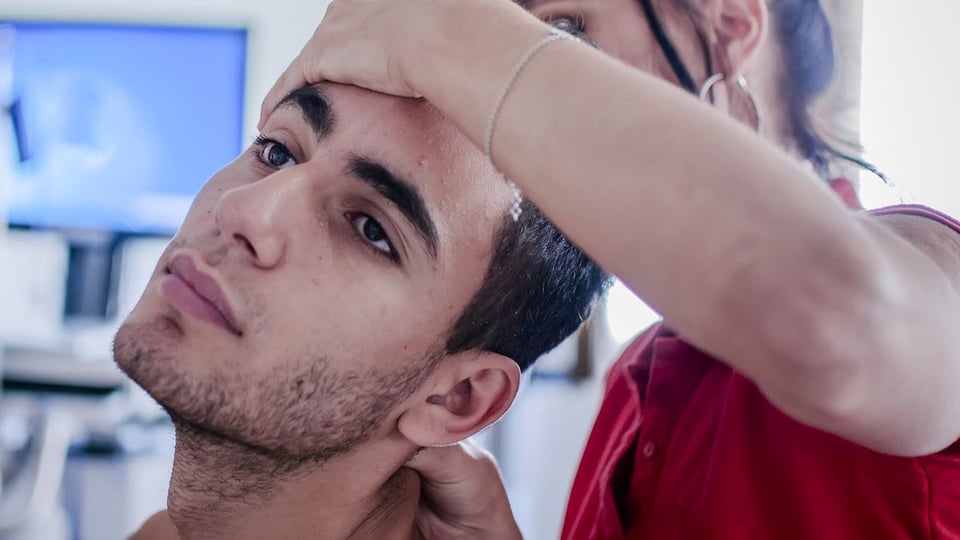Differential Diagnosis of Headaches Post Concussion
Cristin Beazley, PT, DPT, CBIS
Includes all course content in digital format
Prerequisites Required
Description
Concussion is a common injury that is often poorly identified and poorly managed. It can occur with a variety of mechanisms and affects all ages. These injuries can recover on their own but often (10-30%) of individuals will have persistent symptoms. There are a variety of symptoms that can be present after a concussive injury and often headache is one of the most common. Research has shown that individualized treatment results in the best outcomes secondary to the multiple systems that are impacted after these injuries.1 A challenge to concussion management is that none of the symptoms that are often reported are unique to the injury itself. It is essential that clinicians who work with client's post-concussion have a clear understanding of the variety of possible contributing factors to the symptom presentation so that they can create a targeted plan of intervention. This individualized plan and understanding will ensure optimal patient outcomes.
This course will highlight the variety of physiological impairments and systems that can contribute to headache presentation. We will review differential diagnosis as well as targeted interventions to achieve optimal outcomes and patient recovery. The course will present a variety of strategies as well as case studies to help support differential diagnosis strategy. There will also be objective measures including questionnaires, assessments of the cervical spine, vestibular/oculomotor systems, and evaluation of the autonomic nervous system. Participants will be able to take these strategies and a targeted approach and be able to apply them the next day in the clinic.
Highlights
- Quickly improve your clients' outcomes and recovery byanalyzing the potential causes of headache after a concussive event.
- Objective measures including questionnaires, assessments of the cervical spine, vestibular/oculomotor systems, and evaluation of the autonomic nervous system.
- Differential diagnosis as well as targeted interventions to achieve optimal functional outcomes and patient recovery.
Learning Objectives
- Differentiate at least eight common causes of headache after a concussion injury as well as targeted interventions to address them for return to activity and play.
- Analyze targeted clinical questions/patterns and common objective measures to help screen and determine the physiological impairments contributing to the headache presentation.
Course Content
| Differential Diagnosis of Headaches Post Concussion | SCORM Package | ||
| Next Steps | Module |
- Common Impairments Related to Concussion Presentation that Contribute to Headache
- Concussion trajectories and use of the concussion clinical profile screen
- PMH and how it contributes to presentation and impacts recovery
- Review clinical patterns and report to contribute to overall differential diagnosis of headache
- Assessment of cervical spine, vestibular/oculomotor system, sub symptom threshold exercise assessment and evaluation of the autonomic nervous system.
- Targeted Interventions to Address Impairments Related to Headache
- Intervention for the cervical spine
- Intervention for the oculomotor/vestibular systems
- Education related to management of the autonomic nervous system
- Progressive step wise return to activity and play with headache management as primary focus.
- Case study presentation
Cristin Beazley, PT, DPT, CBIS graduated in 2006 with her Doctor of Physical Therapy from the VCU Physical Therapy Program in Richmond, VA. She has worked for the last 16 years with emphasis on pediatrics and neurologic physical therapy with a specific focus on concussion management over the last 10 years. She is the Manager of Clinical Science and Clinical Lead for the Total Concussion Care program at Sheltering Arms Institute and is the lead author of a comprehensive clinical practice guideline that is used to guide treatment.
Cristin is a Certified Brain Injury Specialist and is actively involved in clinical outcomes enhancement research and overall continued program refinement. She currently is the clinical leader for a team of nine therapists and works closely with physicians, SLPs and medical psychologists as part of her team. The sole patient population that she treats are those with a diagnosed concussion. She works with a variety of ages and populations from treating as young as 6-year old's and up through the lifespan, both athletes and non-athletes alike.She has presented at several conferences both locally and nationally on the topic of concussion management and to multiple different levels of providers. She has presented posters on the role of Early PT intervention after concussion at the APTA combined section meeting as well as the AAN Sports Concussion Conference. She has a passion for this population and a goal of improving overall consistency of medical management and treatment of those with a concussion, starting with education and understanding of the complex nature of the injury.
DISCLOSURES
FINANCIAL: Cristin Beazley is compensated by Summit as an instructor. She is Compensated by Sheltering Arms Institute as Manager of Clinical Science.
NONFINANCIAL: Cristin Beazley has no nonfinancial relationships to disclose.
Click here to check accreditation for this course.